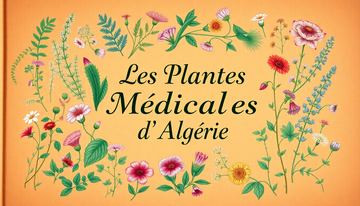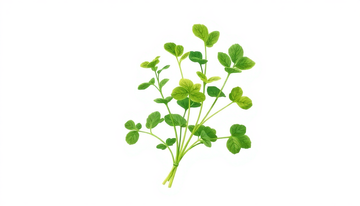Moringa , also known as the "Tree of Life", is a fascinating plant that has been gaining popularity in Algeria in recent years. Originally from South Asia, this plant with multiple virtues has established itself in our country and is attracting more and more consumers looking for natural solutions for their health and well-being.
Presentation of Moringa
Moringa oleifera, by its scientific name, is a tree of the Moringaceae family. Its leaves, seeds, flowers and even its roots are all rich in essential nutrients and full of benefits for the body. Long used in traditional medicine, Moringa is now gaining worldwide recognition as a "superfood" with exceptional properties.
In Algeria, the cultivation and consumption of Moringa is growing, particularly thanks to the awareness of the virtues of this ancestral plant. More and more Algerians are turning to Moringa to boost their health naturally.
Origins and history of Moringa
Geographical origin
Moringa oleifera is native to South Asia, more precisely from the foothills of the Himalayas in northern India. It is in this region that the plant has been used for centuries in Ayurvedic medicine and traditional cuisine.
Over time, Moringa then spread to many tropical and subtropical regions of the globe, particularly in East and West Africa as well as Latin America. Today, it is found cultivated in many countries such as Senegal, Sudan, Brazil and the Philippines.
Traditional use
Since ancient times, local populations in Asia and Africa have been able to take advantage of the multiple virtues of Moringa. Its leaves, seeds, flowers and even roots were used for medicinal, food and cosmetic purposes.
For example, Moringa leaves were consumed for their nutritional properties and their beneficial effects on health. The seeds were crushed to extract an oil with softening properties for the skin. The flowers were used for their anti-inflammatory properties.
Global spread
Thanks to its many benefits, Moringa has gradually gained notoriety and spread throughout the world. Today, it is found cultivated in many tropical and subtropical countries.
In Algeria, Moringa cultivation is growing more and more, especially in the southern regions where climatic conditions are favorable. More and more Algerians are discovering the virtues of this ancestral plant and integrating it into their healthy and natural lifestyle.
Botanical characteristics of Moringa
Description of the tree
Moringa oleifera is a medium-sized tree that can grow up to 12 meters tall. Its trunk is generally straight and its bark is smooth and grayish. Its leaves are composed of dark green leaflets arranged in a pinnate manner along the stem.
Moringa flowers are white and arranged in clusters. They give off a delicate fragrance. Its fruits, meanwhile, are triangular pods that can measure up to 45 cm long. When ripe, these pods open to release winged seeds.
Growing conditions
Moringa is a hardy plant that adapts to many types of soils and climates. However, it prefers warm, dry regions with temperatures between 20 and 35°C.
In Algeria, the most suitable areas for growing Moringa are in the south of the country, where the climatic conditions are ideal. However, it is also possible to grow it in some regions of the north, provided that watering and protection against the cold are taken care of.
Adaptation to the Algerian climate
Thanks to its great resistance, Moringa acclimatizes perfectly to the climatic conditions of Algeria. Whether it is hot and dry summers or relatively mild winters, this tree knows how to adapt and thrive.
In addition, Moringa tolerates poor and arid soils well, making it a crop of choice for the desert regions of southern Algeria. Its deep root system allows it to draw water from deep down and resist drought.
Nutritional properties
Composition of the leaves
Moringa leaves are particularly rich in essential nutrients. They contain high amounts of vitamin A, vitamin C, calcium, iron and protein.
Compared to other foods known for their nutritional benefits, Moringa leaves stand out for their exceptional nutrient content. For example, they contain seven times more vitamin C than oranges and ten times more vitamin A than carrots.
Comparison with other foods
In addition to their nutritional qualities, Moringa leaves are also distinguished by their richness in antioxidants, fibers and minerals. They thus surpass many other foods considered superfoods, such as spinach, bananas or eggs.
This exceptional nutritional composition makes Moringa a true treasure of nature, hence its nickname "Tree of Life". Its health benefits make it an ingredient of choice for a healthy and balanced diet.
Moringa as a superfood
Due to its remarkable nutritional composition, Moringa is increasingly recognized as a true superfood worldwide. Its health-promoting properties make it an ally of choice for those who wish to adopt a healthier and more natural lifestyle.
In Algeria, awareness of the virtues of Moringa is gaining ground. More and more Algerians are turning to this ancestral plant to boost their immune system, regulate their sugar levels or improve their cardiovascular health.
Health benefits
Strengthening the immune system
Thanks to its high content of vitamin C, vitamin A and antioxidants, Moringa is known for its immunostimulant properties. Its leaves, seeds and even bark can help strengthen the body's natural defenses.
Many studies have shown that regular consumption of Moringa can help prevent infections and speed up recovery in the event of illness. It is an ally of choice for maintaining your health on a daily basis.
Anti-inflammatory properties
Moringa also has anti-inflammatory properties due to the presence of bioactive compounds such as isothiocyanates and flavonoids. These natural substances work by reducing inflammation and relieving joint or muscle pain.
Thus, Moringa can be beneficial for people suffering from chronic inflammatory problems, such as osteoarthritis or rheumatism. Its use as a dietary supplement or topical application can provide significant relief.
Regulation of sugar levels
Several studies have shown that Moringa can have a positive effect on regulating blood sugar levels. Its leaves and seeds contain active substances capable of stimulating insulin secretion and reducing glucose absorption.
For people suffering from diabetes or prediabetes, incorporating Moringa into their diet could therefore prove beneficial. However, it is important to always consult a health professional before undertaking any treatment based on Moringa.
Cardiovascular health
Moringa is also known for its beneficial properties on the health of the heart and blood vessels. Its antioxidant, anti-inflammatory and hypotensive properties make it an ally of choice for preventing cardiovascular diseases.
Several studies have shown that regular consumption of Moringa can help reduce cholesterol levels, lower blood pressure and improve blood circulation. It is a valuable asset for maintaining the health of the cardiovascular system.
Effects on weight loss
Due to its high fiber and protein content, Moringa can also be beneficial for people looking to lose weight. Its leaves and seeds are said to promote satiety and reduce appetite, helping to control calorie intake.
Additionally, some research suggests that Moringa may boost metabolism and aid in fat burning. This is a great addition to those looking to adopt a healthier, more balanced lifestyle.
Traditional medicinal uses
In Africa
For centuries, African populations have used Moringa for medicinal purposes. Its leaves, seeds, flowers and even roots are used to treat a multitude of ailments.
For example, Moringa leaves are known for their anti-inflammatory, antiviral and antibacterial properties. They are often used to relieve pain, infections and respiratory problems.
The seeds, for their part, are known for their purifying and depurative properties. They are used to treat digestive disorders, urinary infections and even skin diseases.
In Asia
In Asian medicinal traditions, Moringa also occupies a prominent place. In India, China and other Asian countries, this plant has been used for centuries for its multiple benefits.
Moringa leaves are renowned for their toning, regenerating and aphrodisiac properties. They are often consumed to boost energy, improve cognitive functions and stimulate libido.
The seeds, for their part, are used for their purgative and vermifuge properties. They are also used to treat skin problems, eye infections and respiratory disorders.
Current practices in Algeria
In Algeria, the traditional use of Moringa for medicinal purposes is still relatively unknown to the general public. However, some communities, particularly in the south of the country, perpetuate these ancestral practices.
Moringa leaves are sometimes used for their anti-inflammatory, healing and purifying properties. They can be consumed as an infusion or applied directly to the skin to relieve various conditions.
Likewise, Moringa seeds are sometimes crushed and mixed with oil to create traditional ointments to treat skin problems, infections and even headaches.
Cosmetic applications
Skin care
Thanks to its high content of vitamin C, vitamin E and antioxidants, Moringa proves to be an ingredient of choice for skin care. Its moisturizing, soothing and regenerating properties make it an ally of choice for healthy and radiant skin.
Moringa leaves, seeds and even oil can be incorporated into many cosmetic products such as creams, serums or masks. They help to nourish, protect and revitalize the skin in depth.
Hair care
Moringa also has beneficial properties for hair health. Its nutritional properties and active compounds can help strengthen hair, stimulate growth and prevent hair loss problems.
Moringa oil, in particular, is increasingly being used in hair care. It can be applied as a mask or serum to nourish hair, soften it and restore shine.
Moringa-based cosmetic products
Thanks to its many virtues, Moringa is increasingly present in the composition of high-end cosmetic products. It is thus found in creams, oils, soaps and even shampoos.
In Algeria, some local brands have also developed ranges of cosmetics based on Moringa, thus promoting the benefits of this ancestral plant. These products are enjoying growing success among consumers concerned about their health and well-being.
Moringa cultivation in Algeria
Favorable growing areas
In Algeria, the most suitable regions for growing Moringa are mainly located in the south of the country. The hot and dry climatic conditions, as well as the arid nature of the soils, are perfectly suited to this robust tree.
The wilayas of the Algerian Sahara, such as Ouargla, Adrar or Tamanrasset, offer ideal conditions for growing Moringa. Some areas in the North, such as the High Plateaux, can also lend themselves to it, provided that irrigation and protection against the cold are ensured.
Cultivation techniques
Moringa cultivation in Algeria is usually done from seeds or cuttings. Plants can be grown in open ground or in pots, depending on local conditions.
Watering must be regular






